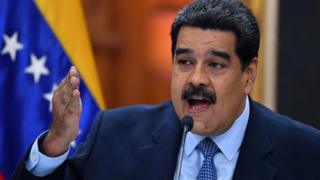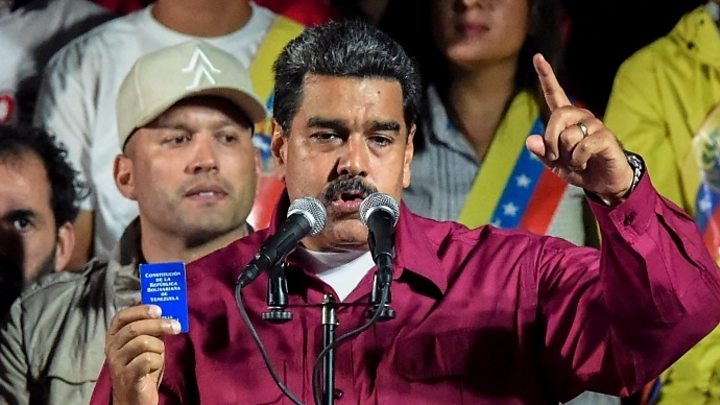 Image copyright
AFP
Image copyright
AFP
Nicolás Maduro has been sworn in for a second term as Venezuela's president, despite international criticism that his re-election was illegitimate.
The May 2018 polls were marred by an opposition boycott and vote-rigging claims.
The US and 13 other countries in the Americas said last week that they would not recognise Mr Maduro's presidency.
The socialist leader, 56, said his second six-year term was a "step of peace for our country."
Thousands of spectators gathered for the ceremony in Caracas, including Nicaraguan President Daniel Ortega, and president of Bolivia Evo Morales.
Security forces were stationed in the capital and other cities, as opposition groups called for pot-banging and the sounding of horns in protest during the ceremony.
Earlier this week, Supreme Court judge Christian Zerpa fled to the US in protest at the president's second term, arguing that the election "was not free and fair."
The re-inauguration took place before the country's Supreme Court instead of its opposition-run Congress, which has been stripped of its powers since Mr Maduro's ruling Socialist Party lost control of it in 2016.
Minutes after Mr Maduro was sworn in, Paraguayan President Mario Abdo tweeted that he was cutting diplomatic ties with Venezuela and was immediately withdrawing his country's diplomats from Caracas.

Why is Maduro's re-election controversial?
Mr Maduro was first elected in 2013, succeeding Hugo Chavez who died of cancer after governing for 14 years.
Since taking office he has faced criticism at home and abroad over alleged human rights abuses and his handling of the economy, which is in a parlous state.
Venezuela is one of the world's largest oil producers and holds the presidency of oil cartel Opec until 2025.
But an overreliance on oil - it accounts for about 95% of its export earnings - left the country vulnerable when prices dropped in 2014.
As a result, the cost of imported goods like food and medicine has risen and currency inflation has skyrocketed.
The government is also increasingly struggling to get credit after it defaulted on some of its government bonds. In response, the government has printed more money, devaluing the currency further.
According to a study by the opposition-controlled National Assembly, Venezuela's annual inflation rate reached an eye-watering 1,300,000% in the 12 months to November 2018.
The US has also imposed sanctions that, Mr Maduro claims, cost the country $20bn last year.
The United Nations says 2.3 million Venezuelans have fled the country since 2015 because of economic hardship.
Anti-government riots in 2014 left 43 dead, and at least 125 people died in months of protests in 2017.
Mr Maduro told reporters last year that the US was plotting to kill him and topple his government, but did not produce any evidence.